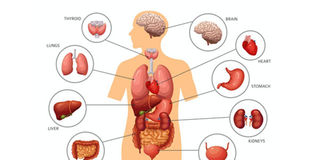Protect Ugandans more from organ traffickers

Illustration: Human organs and systems. PHOTO/COURTESY.
What you need to know:
- The issue: Organ trafficking.
- Our view: Government should increase the capacity of the police to investigate these cases and prosecute alleged traffickers. And this should include the so-called ‘connected people’ who are said to be untouchable.
A lot has been written about the plight of Ugandans working in the Middle East. Whereas many of the close to 150,000 Ugandans working in the Gulf States – Bahrain, Kuwait, Oman, Qatar, Saudi Arabia and the United Arab Emirates – have success stories to share and have developments and investments to show for their sweat, some have horrific tales of suffering to tell.
Those in this category that are lucky to have come home alive recount stories of human trafficking, torture, sexual abuse, slavery and most recently, the new wave of organ trafficking.
The Catholic Church in Uganda and the United Nations Office on Drugs and Crime this week highlighted the crime, warning that the racket includes companies that promise unsuspecting and vulnerable Ugandans jobs abroad.
According to them, the companies process the paper work, buy air tickets pretending to find jobs for those they recruit but they kill the victims and remove precious body parts such as the kidneys, which cost $262,000 (about Shs962m), the heart $119,000 (Shs437m) and the liver $157,000 (Shs576m).
According to the Future for Advanced Research and Studies, a think tank in Abu Dhabi, UAE, the trafficking network includes university professors, doctors, members of nursing staff, and owners of medical centres and labs as well as intermediaries and brokers with prior records.
Government should be credited for its efforts in trying to make the living and working conditions for Ugandans in the Middle East better. These efforts included entering into agreements with some countries, streamlining the labour export business, and creating a shelter for those that are in distress.
Others include investigating labour export companies and complicit officials, implementing provisions of the Prevention of Trafficking in Persons Act, 2009, and increasing convictions for alleged traffickers.
But more still needs to be done. Government should increase the capacity of the police to investigate these cases and prosecute alleged traffickers. And this should include the so-called ‘connected people’ who are said to be untouchable.
The capacity of the Ugandan embassy staff should be increased so that they can help more victims abroad.
They embassy staff should include identification, shelter and timely repatriation where possible.
Finally, government should increase bilateral negotiations with their counterparts that host these Ugandans. This will enable Ugandans workers have rights, including being able to walk out of their contracts should their rights be abused.
Otherwise, the dark world of organ trafficking could be the next big problem Ugandans will write about.
[email protected]




